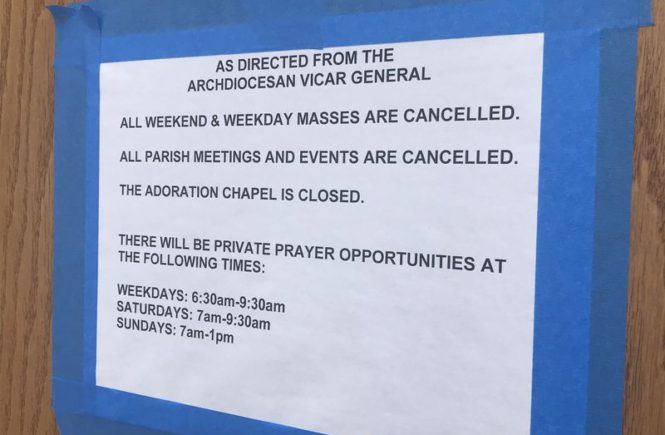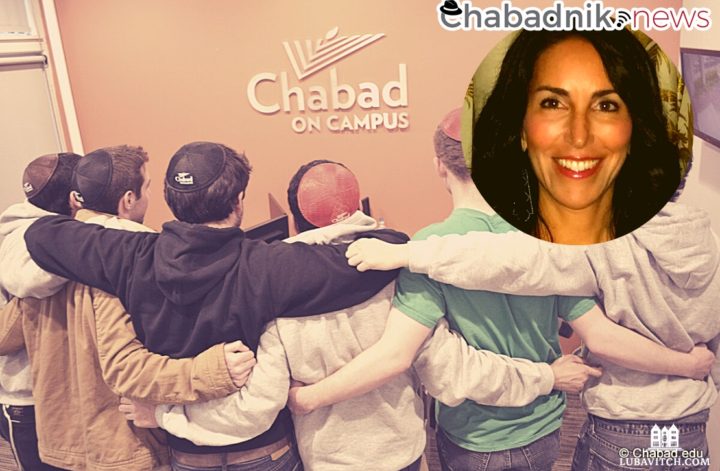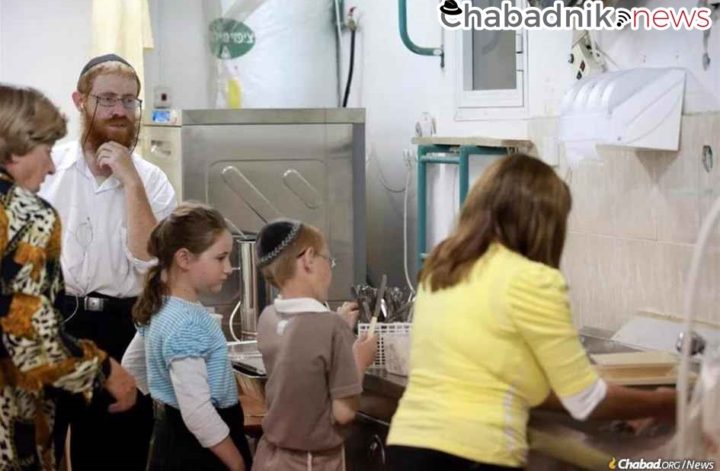For the last 15 years, only the occasional blizzard shuttered the 24/7 perpetual adoration chapel at St. Paul of the Cross Catholic Church in Park Ridge.
But then COVID-19 struck.
The quiet chapel, where volunteers normally offer up prayers day and night before the consecrated host that Catholics believe is the body of Christ, is empty. It was closed last week following Gov. J.B. Pritzker’s directive that public gatherings cease in an effort to control the spread of the coronavirus.
“Some people were extremely sad about it — it’s part of their life,” said Vince Ross, a parishioner who oversees the chapel, whichis open to the public.
Members of faith communities around the country are grappling with a new and uneasy reality: Locked doors on their houses of worship at a time when many are turning to prayer for comfort.
At Chabad and F.R.E.E of Niles, a small Jewish congregation in unincorporated Maine Township, there was no service welcoming the sabbath last Friday, no traditional blessing of the wine.
Friday prayers were canceled indefinitely at the Muslim Education Center and mosque in Morton Grove. And for priests and ministers across the area, Sunday services were still performed, but before empty congregations.
Traditional funerals and weddings cannot be held. Passover and Easter likely won’t be celebrated in the same way they have been for centuries.
A camera, the Internet, a message
But houses of worship are adapting and working to keep their faithful connected during social distancing directives. Their primary tools? A camera, the Internet and messages of positivity.
Across the Chicago area, Sunday services are being streamed online, either live or recorded, so self-isolating congregants can participate from their own homes, watching the clergy they know. The videos are appearing on sites like YouTube, Facebook, Instagram, Vimeo, or directly on the congregation’s website.
Other are using the Internet to post updates and messages of hope on their websites, or are emailing and telephoning congregants directly.
At St. Paul of the Cross, a parish with more than 4,600 families, the Rev. Britto Berchmans still starts his homily with a short joke — even if the chuckles he usually gets from a church full of parishioners are absent.
But people are watching from afar. The first recorded video of a Sunday mass drew more than 5,000 views online, Berchmans said.
“That was very rewarding,” he said.
Adjusting to a closed church without weekly masses and Holy Communion has been difficult for many, Berchmans said.
“What I’m hearing the most is people saying that in these moments of anxiety and uncertainty, we need our church, we need our faith,” he said. “This is when we need God to tell us everything is OK. But then we have to close the church and that makes it hard. As Catholics, people are used to receiving the Eucharist and we are unable to do that.”
Like Berchmans, Rabbi Barry Schechterof Congregation Kol Emeth in Skokie uses humor to lead his congregation and is continuing to do that by sending out daily emails to his membership containing a joke.
“I think it is very healthy for people to be able to laugh,” Schechter said. “The situation is very serious, but if we are bent over with worry that is not a healthy situation and doesn’t help us get through this. It is easy to fall into despair and we need to keep our spirits up. That is very important.”
Stress reduction, meditation sessions online
Unity Church on the North Shore in Evanston has also used online streaming to go beyond weekly worship services. Volunteers have brought their own ministries online, including a stress reduction and meditation session, weekly book discussions, a musical performance, and classes in spiritual living.
“For awhile we’ve been wanting to create a live streaming experience for folks, and now that moves up in priority,” said the Rev. Kurt Condra. “Despite the physical distance, there’s a spiritual connection and we’re being called to find ways to deepen those connections.
In Morton Grove, the Muslim Education Center is not live streaming, but v
Multi-lingual ministries, a daily email blast
Churches that host masses in multiple languages are also continuing to do so in some cases. St. John Brebeuf in Niles, for example, is using YouTube to connect with its Polish as well as English parishioners.
For the Rev. Wayne Watts of Saints Joseph and Francis Xavier Parish in Wilmette, a daily email blast to 2,600 addresses within the parish is a way to stay connected and offer words of encouragement. Teens and young adults have also volunteered to call members of the church’s “vulnerable population” to see if they have any needs , Watts said.
“They end the call with an offer to pray with them, which I think is very encouraging for all parties involved,” he said.
At First United Methodist Church in Park Ridge, weekly Facebook Live services are happening on Sunday mornings at 9:30 a.m., said Pastor David Aslesen.
Small groups that previously met in person have also started to meet virtually, Aslesen said, including a youth group that has started an online session on faith and anxiety.
“Our Lenten season has been all about love,” Aslesen said. “It’s a lot of language about love and loving our neighbors who are sick, feeling isolated, feeling anxious at this time.”
Across town, at South Park Church, teens are attending lessons on Facebook and Instagram, while small groups are meeting for short, weekly devotionals through Zoom, a video conferencing app.
Video calls with patients
Rabbi Lazer Hershkovich, of Chabad and F.R.E.E., said that while the doors to the center are physically closed, access to the faith is not
“We’re available — by email, YouTube, phone, whatever it is, we’re here for the people,” Hershkovich said.
What Hershkovich has been unable to do, however, is visit with members of the community who reside in area nursing homes, which is an initiative of his program Chabad Cares. With nursing facilities closed to visitors, volunteers have turned to sending mail and working with staff to allow for video calls with patients, Hershkovich said.
Sharing a message of hope
In addition to connecting with the faithful, faith leaders are using their religious traditions to share hope and comfort with their flock.
Watts says he recalls the prayer of St. Francis de Sales, which begins, “Do not look forward to what may happen tomorrow; the same everlasting Father who cares for you today will take care of you tomorrow and every day.”
“We believe in a God who loves us and watches over us,” said Berchmans. “In these dark times, we have to remind ourselves the Lord is risen and that darkness and sickness cannot have a hold on us. That’s what we believe.”
“Spread faith, not fear,” said Hershkovich. “Offer prayers, not panic. Share compassion, not confusion.”



